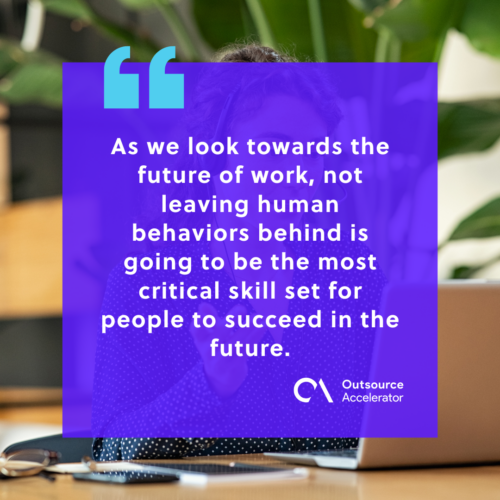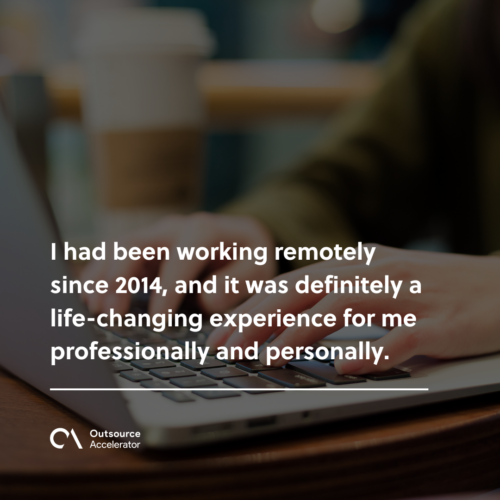The Remote-Work Reality with Ali Greene, Co-Author of Remote Works

Remote Works
Derek Gallimore talks with Ali Greene, the author of Remote Works: Managing for Freedom, Flexibility, and Focus.
Ali is a remote and digital nomad veteran. She has been working across the globe for various companies.
Since about 2014. Ali has worked for some of the biggest names in the remote work scene, and she’s generally an all-around expert on the topic of remote working.
The motivation and process behind Remote Works
As a digital nomad since 2014, Ali stated, “it was definitely a life-changing experience for me professionally and personally.” That said, she noted that writing the book has been an “organic” process for her.
When COVID hit three years ago, she recalled, “When I saw all the chaos in the media and texts from friends how they were struggling to adapt to this new way of working, I had a really big fear that if we did not get this experiment right that people would not be allowed to have the same amazing opportunities that me and my co-author Tam [Sanderson] had in remote work.”
Ali met Tam in Cape Town while working remotely in 2017. During the “early days of the pandemic,” Ali said, “We’re catching up on text messages about, “Can you believe this company is making people sit in front of zoom from nine to five all day long? This is not what the future of work is all about.””
“And so we knew at that point in time, we wanted to help educate the future managers, team members, [and] knowledge workers about how they can work better in order to live differently.”
Ali and Tam never met each other while writing the book. Describing the process, Ali said, “We really wanted to get the community involved… We also were conducting a lot of interviews with people that had worked at all remote companies. We had all these moving pieces.”
The Remote Works author described the book as “one of the most creative projects I’ve ever worked on.”
“It really did amplify all of the lessons I had learned.”
How governments and companies can help digital nomads
While acknowledging the many technological improvements, Ali believes “there’s still a lot of improvement that needs to be made in all sectors.”
For governments:
“I think governments need to figure out and determine their strategy for welcoming foreign workers for short periods of time and looking at the benefits that can bring them from an economic standpoint, especially outside of tourist seasons.”
Ali added, “We see in the media things like digital nomad visas, but they can be messy and complicated and not really make a lot of sense…
I think a lot of companies are also still very scared about compliance and taxes, and legal issues.
But I would remind those companies that they’re not an island, and they do not have to figure this out alone.
There’s plenty of companies and consultants that they can outsource these worries to, such as global EOR companies, or tax consultants abroad, that can really help them understand how to drive their internal policies and their strategy to allow their employees and the people that they work with to have more location flexibility.”
For companies:
“I definitely think it is [an] opportunity for HR to seek help from people that are knowledgeable and specialized in the subject because things are constantly changing.”
Ali advised companies, “It’s important that you build out external resources of people you trust to help you stay up to date on the most current events.”

The remote work skills you need to succeed
As advice to Gen Z employees who will be entering the workforce, the Remote Works author said, “I think there’s core human traits that are never going to go away in business.
And as we look towards the future of work, not leaving those human behaviors behind is going to be the most critical skill set for people to succeed in the future.”
Ali noted the following remote work skills as necessary to remote/hybrid work:
- Learning how to be authentic. “If COVID did a few good things in the world, I think it taught people that it’s okay to be authentic.”
- Communicating asynchronously.
- Conflict-solving skills. “Show yourself virtually learning how to communicate and solve conflict and tension and disagreements in a healthy way. [Don’t] shy away from that conflict, because conflicts can be really productive for people and for companies.”
- Listening with empathy.
- Building relationships with coworkers.
For those interested in buying the book, feel free to visit https://www.remoteworksbook.com/. You can also connect with Ali via her LinkedIn page.








 Independent
Independent




